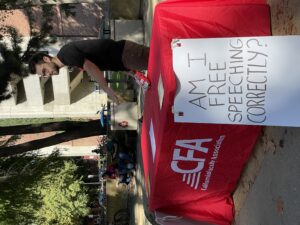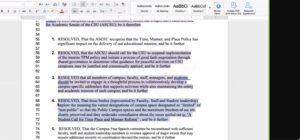The Chico State Academic Senate has called on the California State University (CSU) Chancellor’s office to suspend the interim “Time, Place, Manner” (TPM) policy that sets rules for student protests.

The Oct. 31 resolution says the CSU should “initiate a process of good faith negotiation through shared governance to determine what guidance for peaceful activism … may be justified and consensually applied.”
The local Academic Senate took action days after the Academic Senate of the California State University system passed a resolution condemning the CSU-wide interim TPM policy. The California Faculty Association notes the policy restricts use of face coverings and requires “advance written permission for posters, signs, banners, and chalking.”
At a September forum at Chico State, Joseph Morales, university diversity officer, explained that the Chancellor’s office developed the framework each campus would use for a TPM policy; each campus was then asked to prepare an addendum detailing how the policy would be implemented.
The main complaints from forum participants then were about potential restrictions on free speech and a lack of transparency and communication in the decision-making process.
ChicoSol covered the open forum held in September and found some inconsistencies in the draft policy: The areas the university said were available for free speech activities were classified as Limited Areas, where sound amplified activities including protests, demonstrations and marches, were prohibited.

After the September forum, Chico State posted a revised addendum. One major change is reclassification of outside spaces on campus. Based on the new addendum, outside spaces such as Kendall Lawn and Trinity Commons are reclassified as “Public Areas” available for public assembly, marches and protests. These areas had been classified as “Limited Areas” and could only be used for “non-amplified speech and expression” in the previous addendum.
Senate Chair Jeff Trailer said the resolution, which passed with a 29-1 vote, would be sent to the decision-makers.
“The resolution is a way for the Senate to communicate a sense of what our opinion is on the matter,” Trailer said. “It doesn’t have any binding effect; it’s not a policy that has a direct consequence. It’s a statement of opinion.”
The Senate is composed of faculty, staff, administrators, and students and “guided by the principles of shared governance.”
The resolution also takes issue with the restriction on mask-wearing during student protests. The CSU umbrella policy prohibits people from wearing a mask “with the intent of intimidating and harassing any person or group, or for the purpose of evading or escaping discovery, recognition, or identification in the commission of violations of applicable University policy or local, state, or federal laws.”
Chico State’s resolution questions those restrictions. “It’s unclear who defines intent and what limitations there are to define negative intent … and the interim TPM policy inappropriately connects masking to criminal activity …,” it states.
Senator Timothy Sistrunk, a professor in the History Department, helped draft the resolution. He stated during the meeting that multiple CSU universities offered resolutions for the CSU’s consideration, and his subcommittee drew from San Francisco State’s language and incorporated points specific to Chico State to shape the resolution.
The Senate made several amendments to the resolution during the Oct. 31 discussion, including the removal of a clause that mentioned a Senate resolution that passed in May and showed support to demonstrators protesting the war on Gaza.
“To me there is no progress until the Chancellor’s policy is repealed” — Adin White
Bryce Ingersoll was part of a student group that produced a document to call for TPM reform before the Senate meeting. Ingersoll expressed his disappointment that the Senate struck out the clause about Gaza protests. “Some senators said it was because it was unnecessarily controversial in a document where most of the Senate just cared about collective governing,” he said.
“But all that clause did was explicitly provide protections in an action that is already implicitly protected.”
Ingersoll mentioned several points that were missed in the resolution: “There’s still stuff that we want in the resolution (and) that we have problems with, such as loosening the definition of disruption, criminalization of policy infringements.”

Public Health professor Lindsay Briggs indicated she was glad Chico State revised its addendum, and placed the largest share of blame for the policy on the Chancellor’s office.
“It needed to be changed,” she said. “And the university heard us. That’s positive, within a very negative situation … It’s the Chancellor’s office that dictated. It’s the Chancellor’s office that is trying to restrict our freedom.”

Briggs said she has been upset since “the CSU and different campuses become more and more authoritarian, and way less about valuing faculty perspectives and staff perspectives, under the guise of saying, like, ‘We’re trying to do this to make things better for students.’”
Adin White, an anthropology major, organized the student group that called for TPM reform prior to the Oct. 31 Senate meeting. He believes the resolution is a step in the right direction, but not enough.
“To me there is no progress until the Chancellor’s policy is repealed,” White said. “I hope the Chancellor’s office can take the policy back to the table and invite stakeholders there to be a part of the process of creating the document.”
Yucheng Tang is a California Local News Fellow reporting for ChicoSol.
